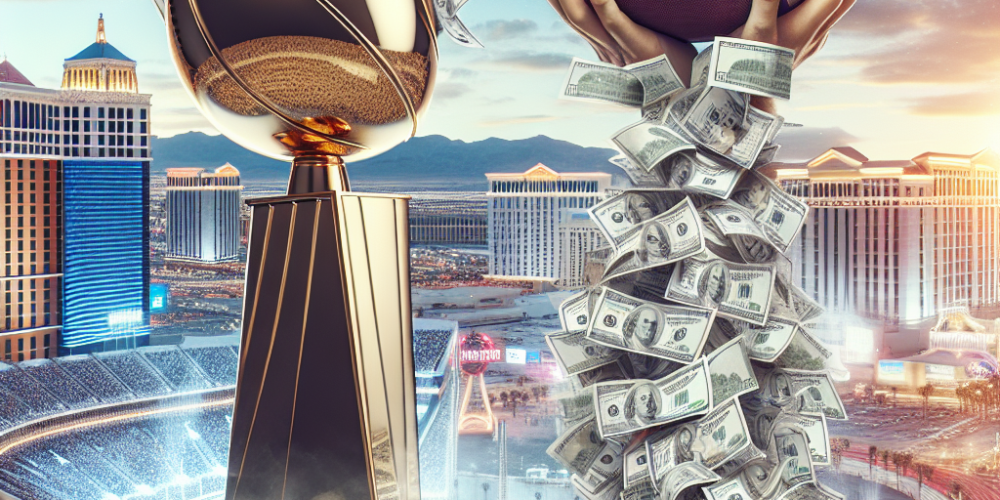Las Vegas is once again solidifying its status as a top-tier sports destination, as tourism leaders approve a substantial financial package to attract major sporting events to the city. The Las Vegas Convention and Visitors Authority (LVCVA), the official organization responsible for promoting tourism, conventions, and events in Southern Nevada, has pledged $3.65 million to host two significant sporting events.
The first event on the agenda is the Emirates NBA Cup, set to take place at T-Mobile Arena from December 14 to 16. This marks the third consecutive year that the NBA has chosen Las Vegas for its semifinals and finals. The LVCVA plans to invest $1 million as part of a crucial sponsorship deal that will offer advertising, marketing, and hospitality opportunities before, during, and after the tournament. Brian Yost, the chief operating officer of the LVCVA, highlighted the importance of this contribution, emphasizing that it underscores the city’s commitment to maintaining its role as a prime location for high-profile sports events.
The 2025 tournament, featuring a headline match between the Oklahoma City Thunder and the Milwaukee Bucks, brought in over 17,300 fans from outside the city and resulted in nearly 19,000 hotel bookings. The championship game, which culminated in a victory for the Bucks, captivated nearly 3 million television viewers on ABC. In a strategic move, the NBA has partnered with Prime Video to stream next year’s semifinals and finals, potentially reaching an even wider audience.
In parallel, Las Vegas is gearing up for the return of the Las Vegas Kickoff Classic, a celebrated college football series set to resume at Allegiant Stadium in 2027. After a brief hiatus in 2025 and 2026, the event will make its comeback on Labor Day weekend under a new four-year agreement with ESPN Productions. The LVCVA has earmarked $2.65 million for this series, with staggered funding starting at $1 million in 2027 and tapering to $350,000 in 2029, before increasing again in 2030.
The Kickoff Classic is anticipated to attract more than 290,000 visitors and generate over 215,000 hotel room nights during its four-year span. Clint Overby, ESPN’s vice president of events, expressed optimism about the event’s draw, stating that the combination of Las Vegas, Labor Day, and college football creates an ideal setting for ushering in the new season. The previous game between USC and LSU drew nearly 59,000 fans to Allegiant Stadium, with around 90% of attendees traveling from outside the region.
The upcoming matchups have already been determined, with Miami set to face Utah and North Dakota State squaring off against Montana State in 2027. BYU will take on Oregon State in 2028, followed by a clash between Montana and South Dakota State in 2029. The 2030 game will feature Texas Tech and Arkansas, reigniting their regional rivalry. John Saccenti, who manages the Vegas Kickoff Classic, noted that these matchups between national programs are expected to boost interest and attendance, further cementing Las Vegas’ reputation as a sports hub.
While the focus is on the economic and tourism benefits these events are projected to bring, there is a broader strategy at play. Las Vegas officials are keenly aware of the city’s current tourism challenges and are banking on sports as a catalyst to invigorate local businesses and fill hotels. The integration of sports into the city’s tourism strategy is seen as a way to navigate through economic uncertainties and keep Las Vegas bustling with activity.
However, there are alternative perspectives on this investment. Some analysts caution that while sports events do provide short-term boosts in tourism and spending, they may not offer a sustainable solution to the broader economic issues facing Las Vegas. The city’s reliance on hospitality and gaming industries means that a more diversified economic strategy might be necessary to ensure long-term stability. Critics argue that resources could also be directed towards other sectors of the economy to build resilience against future downturns.
Despite differing viewpoints, the consensus remains that sports events have a significant role in rejuvenating Las Vegas’ image and economy. The city’s ability to attract high-profile competitions is seen as a testament to its infrastructure, hospitality, and appeal. With both the NBA and college football spotlighting Las Vegas, there is optimism that these events will draw crowds and keep the city vibrant, even in challenging times.
As Las Vegas prepares to host these major events, it not only showcases its capacity as a premier sports destination but also signals its ambitions to remain at the forefront of the sports and tourism industries. The coming years will undoubtedly test this strategy, but for now, Las Vegas is poised to make a substantial impact on the sports tourism landscape.

Garry Sputnim is a seasoned journalist and storyteller with over a decade of experience in the trenches of global news. With a keen eye for uncovering stories that resonate, Alex has reported from over 30 countries, bringing light to untold narratives and the human faces behind the headlines. Specializing in investigative journalism, Garry has a knack for technology and social justice issues, weaving compelling narratives that bridge tech and humanity. Outside the newsroom, Garry is an avid rock climber and podcast host, exploring stories of resilience and innovation.
















